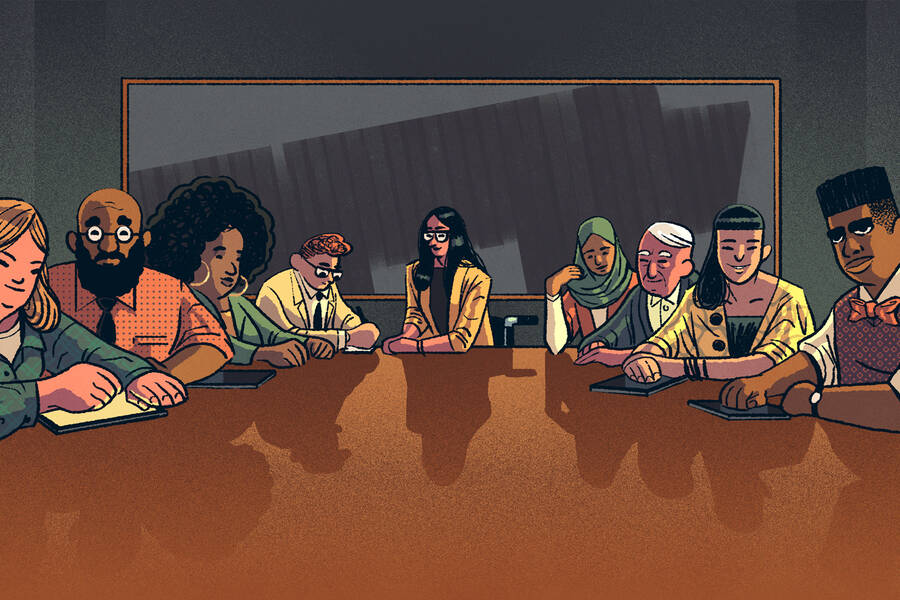Leadership Jan 23, 2025
Handling Worry, Fear, Anxiety, Pressure, and Stress
No matter the situation, you will need to focus on doing the right thing. Here’s how.

Lisa Röper
“What keeps you up at night?”
I was asked this question at the close of a presentation to a senior executive team on values-based leadership. Clearly, there is no shortage of possible causes of insomnia, especially for leaders these days—from managing AI’s inroads into the workplace to nonstop social-media blitzes and increased polarization.
Yet, my honest answer was, “Nothing.”
Seeing the surprised expressions on the faces around me, I explained: “I stay up very late so, by the time I get to bed, nothing can keep me awake.” My ability to sleep, though, has little to do with merely being tired.
One of the reasons I’m up so late is that, after the last email has been sent and the last voicemail has been responded to, I spend 15 minutes each evening in self-reflection. I think about what went well and what didn’t go well that day; what had I promised to do, and did I keep my word? With this perspective, I focus on two goals I’ve set for myself for the past forty years: to do the right thing and to do the best I can.
As a values-based leader, I realize these two goals are the most effective ways for me to combat five negative emotions we are all susceptible to: worry, fear, anxiety, pressure, and stress. I recognize that for some people mindfulness may be helpful but not sufficient. As a healthcare executive all my career, I appreciate the value of clinical treatment for mental-health issues. However, I believe that all of us can benefit from spending time self-reflecting and giving ourselves the guidance and peace of mind that comes from this practice.
As a husband with five children and one grandchild, and as a former chair and CEO of a $12 billion company with 55,000 employees, I have found it to be tremendously helpful and healthy to know one thing: no matter what happens, with the help of others, I will do the right thing and do the best I can.
Continuously focusing on doing the right thing reinforces values-based leadership, which emphasizes influencing and relating to others.
—
Harry Kraemer
The benefits of this mindset are numerous. First, continuously focusing on doing the right thing reinforces values-based leadership, which emphasizes influencing and relating to others. Second, by doing the best we can, we become role models for how others should be thinking and acting. Third, and equally important, doing the right thing significantly reduces stress, which supports your health and well-being at a time when research shows that 55 percent of CEOs and 50 percent of their team members experience mental-health issues such as anxiety, depression, and burnout.
Here’s how I focus on doing the right thing and the best I can:
Life as a Sine Wave: I don’t know a single person whose life just keeps getting better and better, as if following a straight upward trajectory. Instead, life is far more likely to follow a sine-wave pattern, up and down, while hopefully trending higher. Along the way, there will be peaks where things are going well for you, as well as valleys where you experience loss, disappointment, and failure—both personal and professional. Knowing that, you can prepare in advance for how you will respond to whatever happens, instead of waiting for it to happen.
When Things Go Well: The response to this seems easy—gratitude and celebration. It’s important for leaders to thank everyone on the team and reward them for contributing to the organization’s success. The same goes for personal achievement—perhaps gathering everyone who has provided support and throwing a party. What too many people miss, however, is that even in the midst of the celebration, they should be preparing for the inevitable change in circumstances. The question to ask yourself is: What am I going to do when things turn downward? As I’ve witnessed and experienced in my own career, difficulties and challenges are not a matter of if they’ll occur, but rather when. For example, a company may do well for multiple consecutive quarters, sending its stock price steadily higher. However, the day will come when the company faces a challenge, such as a new competitor, a regulatory change, or a product recall. There may even be a crisis, such as an accident at a manufacturing plant. And the larger the company, the more likely it is that a challenge or crisis will occur at some point. There has never been a company that has always been successful, so why would you think yours will be immune?
When Things Go Badly: This is where your self-reflection during the good times pays off. When disappointments and difficulties happen, you are not surprised or shocked, nor are you complacent. Instead, you know exactly how to respond. You have already committed to doing the right thing and doing the best you can. But given the specific circumstances, what is the right thing to do? Through self-reflection, you will gain insight into what is happening and why, as well as what you can do to address it. In addition, as a values-based leader, you surround yourself with people whose values and perspectives you know and trust. That’s why you have a team! No one has all the answers. But with a great team, you are far more likely to identify the right thing to do and do the best you can. And, if it turns out that the “right thing” didn’t fully solve the problem, then you’ll reflect some more, engage with the team, and recalibrate the next right thing to do.
When More Things Go Wrong: There will be times when you face more than one stressor, for example, new competitive pressures and a problem with your company’s production. Or, in your personal life, you could face a problem with your health and a relationship at the same time. Let’s face it, life can be difficult. Even when it seems like what’s going wrong keeps compounding, there’s no need to give in to worry, fear, anxiety, pressure, and stress. Once again, self-reflection and the perspectives of trusted advisors help you determine what is the right thing to do. Not only that, but if you are truly self-reflective and constantly seek input from others, you may be able to do the right thing proactively, instead of only reacting with a solution after the fact.
When I share these thoughts with others, from MBA students to senior executives, it often takes a while for these concepts to sink in. Sometimes they struggle with accepting that a commitment to doing the right thing could have such a positive impact. The secret is consistency.
None of us knows what will happen tomorrow. Yes, we have our priorities and our plans, but it’s inevitable that at some point we’ll be hit with the unexpected. Personally, when faced with uncertainty, I always ask myself, “What’s the worst thing that could happen tomorrow?” Instead of this being a scary thought, I choose to find it enlightening.
First, I can envision the worst-case scenario—a loved one receives a serious diagnosis, a relationship is broken beyond repair, a business is headed for bankruptcy. I will hope and pray that the worst case does not materialize, knowing that situations are often not as dire as they may seem at first. But no matter what occurs, I will self-reflect and engage with other values-based people in my life. I know that with these insights, I will determine the right thing to do—and then do the best I can.
*
This article originally appeared in Forbes.



